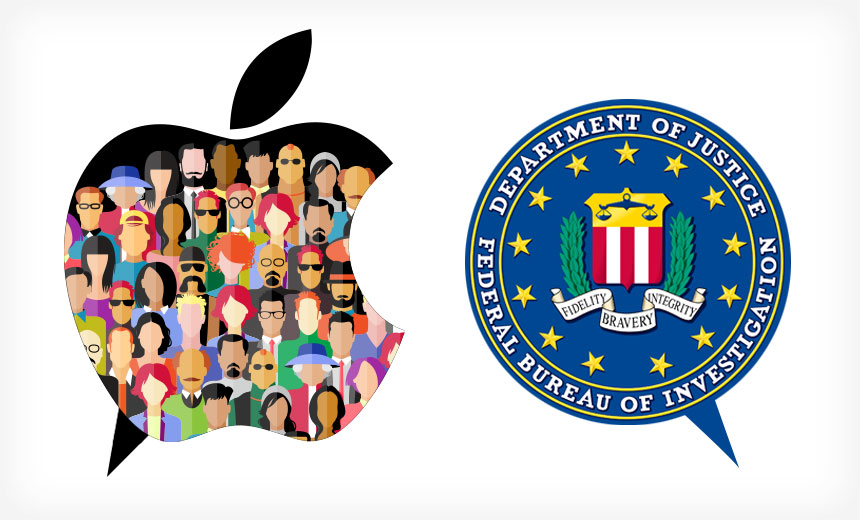
Who's right: Apple or the FBI?
See Also: 2015 Breach Preparedness and Response Study: The Results
Debate continues to rage over a magistrate judge last week ordering technology giant Apple to unlock the iPhone of Syed Rizwan Farook, who participated in the December 2015 shootings in San Bernardino, Calif., that left 14 people dead and 22 seriously injured (see The Crypto Debate: Apple vs. the FBI).
A recent Pew Research Center survey of 1,002 U.S. adults found that 51 percent believe Apple should assist the FBI and 38 percent do not, citing the need to secure individual's data (see Apple, FBI Escalate Crypto Fight).
The debate is complicated, in part, because the case involves not just technology and legal questions, but also more emotionally loaded discussions of public safety and what the FBI has categorized as a terrorist attack.
In their comments on many of our recent pieces - including Apple, FBI Draw Lines in Crypto Battle, The Crypto Debate: Apple vs. the FBI and DOJ: Apple Puts Marketing Before Law - our readers continue to debate what's at stake and how Apple should respond.
Thou Must Obey Court Orders
"Nothing should be beyond the realm of a judicial approved court order," says Hollis Segur. "That is what our justice system is built on. ... You give up your privacy when you break the law. ... I would boycott all Apple products if Tim Cook does not allow this to happen and it must happen quickly."
Another reader voices a similar perspective, citing Apple's moral culpability: "Does the [manufacturer] have the right to protect criminals, who cause serious harm to our society?" the anonymous reader asks. "Maybe Apple should answer to the relatives of the ones who were gunned down in cold blood that they believe in protecting criminals and don't give a damn about the rest of us."
Hackers Heart FBI Victory
But Steve Sommers cautions that if the case results in mandated crypto backdoors, innocent people would suffer. "Not only will governments have free access to your private data, it'll be big beautiful and juicy low hanging fruit for hackers to attack and exploit," he says in a story comment. "I'm absolutely sure hackers are hoping for a quick FBI legal victory in this case so they can get cracking."
Or as another ISMG reader, Bon Baughn, puts it: "Apple isn't protecting criminals. They are protecting you."
Keep Surveillance in Context
Meanwhile, information assurance consultant William Murray, who's an associate professor at the U.S. Naval Postgraduate School, accuses the government of attempting to compel technology giants to give them carte blanche access to devices by "making them appear to side with terrorists and criminals if they refuse." Lost in that discussion, he warns, are the surveillance capability advances governments have gained in recent years. "Even without backdoors, the investigative capability of law enforcement, not to mention the surveillance capability of the nation state, is orders of magnitude greater than anything they might have hoped for as recently as a decade ago," he says. "They are never satisfied" (see Why 'Cryptophobia' Is Unjustified).
Backdoors Hurt Investigations
Turning the tables on the FBI, meanwhile, another reader suggests that the current order would in fact make life more difficult for friendly law enforcement agencies. "The reality is that law enforcement shoots itself in the foot if this government order stands" says Greg - no last name listed - who cautions that if the bad guys know that the good guys can bypass iPhone crypto, they'll seek other, harder-to-crack tools, be they smartphone-based or otherwise. "Next time, the bad guys won't use commercial stuff for encryption. There are plenty of other ways to do it and bad guys are not constrained by the same rules as the good guys."
White House Weighs In
There are no easy answers in this debate, with the FBI saying Apple must comply with a lawful order, while Apple argues that this creates a dangerous legal precedent.
The clash was perfectly encapsulated - perhaps unintentionally - by White House Press Secretary Josh Earnest during a Feb. 22 briefing, when he was asked to comment on this matter. "The administration believes - and the President has said this personally - ... the American people benefit from robust encryption that protects their privacy and civil liberties [and] that ... is a protection that's worth supporting," he says. "At the same time, our law enforcement and national security professionals have an obligation to keep us safe and to do what they can to keep us safe."
Easy Answers? No Way
Even the technology sector appears divided. Microsoft founder Bill Gates has supposedly backed the FBI in this case, Financial Times reports, although Gates on Feb. 23 told Bloomberg that he was "disappointed" with that report, saying that the right balance needs to be struck. But other technology CEOs - including Facebook CEO Mark Zuckerberg, Google CEO Sundar Pichai and Twitter founder Jack Dorsey - have publicly backed Apple CEO Tim Cook's move.
Whatever happens, don't expect any quick answers. With Congress out to lunch on the cybersecurity front, the courts may resolve these questions, although legal experts say this case might well require two years to reach its conclusion.

